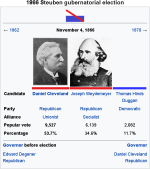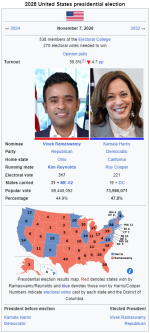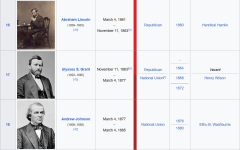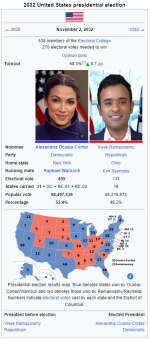We have rebelled against all controls and religions, all laws and judgments which the mighty sought to foist upon us. We kept to our dedication and our missions. By these will the State be judged, by the moral character it imparts to its citizens, by the human values determining its inner and outward relations, and by its fidelity, in thought and act, to the supreme behest: "and thou shalt love thy neighbor as thyself."
-David Ben-Gurion
Israel in a Three-Way Cold War (1945-1975):
After WWII, and even after Nakam poisoned the water supply of Bavaria, the post WWII calls for the establishment of a Jewish state would be loud, and lead to the formation of Israel in 1948. All three major powers and blocs enthusiastically backed Israel's formation at the beginning. The western Anglo-American bloc saw broad support for Israel, with both the left-liberal Henry Wallace and archconservative Winston Churchill being major supporters. Indeed, Wallace's loyalty (and his opponent Eisenhower's lack of enthusiasm for the state), would lead to Wallace winning the Jewish bloc easily, even as he was destroyed nationally. Soviets, who had long opposed Zionism, soon came to support Israel, with Stalin, despite his personal antisemitism, recognizing the state in 1948. Possibly the most enthusiastic of the three powers were the Japanese. Koreshige Inuzuka, who became Japan's Minister of Overseas Affairs, had read the famed antisemitic
Protocols of the Elders of Zion, and instead of becoming antisemitic as a result, viewed the Jews as powerful, and good allies for the Japanese Empire. As such, the Japanese Empire had major support for Japan, and would recognize the nation in 1948 as well.
Israel's independence in 1948 led to the First Arab-Israeli War shortly after independence, as the Arab League opposed Israel's formation, calling for an independent Palestine (while blocking the formation of a Palestinian government). While the Arab League expected an easy victory over the Israeli state, Israel would prevail, beginning the
Nakba, where 700,000 Palestinians were either expelled or fled Israel. Alongside the
Nakba came the mass expulsion of Jews from Arab nations (declared the "Jewish Nakba" by later sources[1]). As a result of this, and an exodus of Holocaust survivors, people fleeing the post-Nakam pogroms of 1946-48, and the Beria government allowing thousands of Jews to leave the Soviet Union after pogroms began in Georgia following allegations of "Jewish influence" in Stalin's death[2], the population of the state of Israel would increase to around 2.8 million[3] by 1960.
Israel-United States relations would deteriorate as Henry Wallace left power and the nation continued to grow. The Free Officers Coup in 1952 was welcomed by the United States, and as Eisenhower won a crushing re-election against the Liberals, dying Democratic party, and "Constitution Party", he was planning a Middle Eastern Defense Organization with Egypt's new leader, Gamal Nasser, although Nasser was less enthusiastic about the decision, and the Organization would fail. Indeed, when the Suez Crisis, a conflict between Anglo-Israeli forces and Nasser's Egypt broke out, Eisenhower remained neutral, angering the British and Israelis. Israel would end up occupying the Sinai Peninsula as a result of the conflict, further causing conflicts with the US.
While Eisenhower maintained a policy of trying to win over both Arabs and Israelis - based on the mistaken opinion that both sides would put aside their differences to oppose communism - his successors would become much more hostile. Israel's occupation of the Sinai would lead to Eisenhower's successor, Jack Cox, sanctioning the small nation for its occupation of Sinai[4], although said occupation would end shortly into Cox's term in 1957. The United States' growing hostility and hope of forming alliances with Nasser and other Arab regimes, especially in the face of France's "semi-neutralist" stance on the Cold War[5] after the Soviet Union promised to withdraw support for the Algerian FLN, would put Israel in a strange place. Still broadly supported by the UK, Japan, and Soviet Union, American hostility would push them further and further into support from the Soviets. In 1965, under the presidency of George Lincoln Rockwell, things would finally come ahead, with the United States and Israel conflicting over the Israel nuclear plan. Rockwell would continue to come into conflict with David Ben-Gurion over the program, which would lead to a divide in relations. When Israel would end up buying weapons from the Soviet regime, which would lead to a brief break in the Anglo-American alliance, as Rockwell would sanction the Israelis.
Soviet support for Israel would eventually lead to Eisenhower's plans for a Middle Eastern Defense Organization coming true. Nasser, along with his new allies in Syria and Jordan, would align with several other nations, largely helped by Rockwell's anger at the Israeli state. In 1967, a year after the MEDO was forged, Israel would invade the Sinai, and with Soviet and Japanese support, would retake the Peninsula and the Golan Heights. The war began the final break with the English, who were repelled by Israel's allegiance with the Soviets.
In 1968, political reform would begin in the country, as David Ben-Gurion, now split off from his
Mapai party, would form the
Rafi party, which soon replaced Mapai as the leading left-wing party in Israel. The party, led by Gideon Ben-Yisrael, would win the 1969 elections, promising to fix the electoral system of Israel, and would shift it towards first-past-the-post. Yisrael's premiership would see even closer ties with the Soviets, and Israel's growing influence in sub-Saharan Africa. In the Nigerian Civil War, they backed the breakaway Biafrans, in Kenya, Rhodesia, and South Africa they backed African revolutionaries, and in the Sudanese Civil War, a war which saw Israel align with Patrice Lumumba's Congo, Ethiopia, France, Japan, and Spain against the Communist-led Sudan backed by the Soviets and United Kingdom, they sent troops led by David Ben-Uziel.
With Al Gore I's election in 1972, Israel hoped for an improved relationship with America, hoping to once more gain support from all three major powers. However, while Gore visited the Congo and broke bread with Lumumba and forged the Euro-American Trade Community, he all but maintained Rockwell's stance on the state, and continued to heavily support Nasser. As such, Israel has only further joined the Soviet bloc, and its leadership has since been targeted by the CIA, culminating in the assassination of Moshe Dayan in 1974.
[1]
OTL
[2] Based on the "Doctors Plot" allegations and
1956 Georgia Uprising
[3] Slight increase from OTL - notably the population stays much more European due to Nakam, causing Labor Zionism to stay in vogue for longer - although that's a change that effects a later period than this is covering.
[4]
https://www.jta.org/archive/eisenhower-reveals-his-1957-aims-to-penalize-israel-on-sinai-issue
[5]
https://en.wikipedia.org/wiki/Suez_Crisis#Canal_nationalisation
State Politics in a Three-Way Cold War
The supreme issue, involving all others, is the encroachment of the powerful few upon the rights of the many.
-Robert LaFollette Sr.
As the two-party system puttered down and the Democratic party began to collapse into the Liberal party, it should be noted that Wisconsin didn't really have this problem. The Progressive Party, once dominant, was almost entirely shut down by 1946, especially after an extremely weak statewide performance, where they would win 5% of the vote in a three-way race for senate. The result was that party founder, Robert LaFollette Jr., would shut down the party completely, and rejoin the Republicans, with Merlin Hull, the long-serving congressman from Wisconsin's 8th congressional district doing the same.
Robert LaFollette Jr. was not the man his father was, and it was noted that when he returned to the senate in 1947, he did so with a vengeance. The LaFollettes, once noted isolationists and leftists, took a new turn. LaFollette was originally supposed to advise Henry Wallace on foreign politics, the two being close friends, but the relationship ended as LaFollette took a hardline against America's labor unions. He called for investigations of several CIO affiliates[1], and when Eisenhower entered office he became a noted enthusiast of Eisenhower's anti-union laws, and supported Taft-Hartley both times it was put in front of him. LaFollette's bold anti-union tactics hurt him in a state where, thanks to the LaFollettes, unions held a strong position.
All of this made LaFollette nationally notable, but it would be cause for his defeat. 1952 was the last gasp of the Democratic party, nominating Happy Chandler in an attempt to unite warring factions. Chandler pleased no one. The "Liberal Party" was formed by former Roosevelts and union leaders, and southerners (and for some reason Henry Wallace) backed Eisenhower for re-election, and for Chandler's trouble he won Kentucky, his home state, while losing a blowout. However, on a statewide level, it would take decades for the Democrats to fully die out. In Wisconsin, where Democrats had long struggled, the Democratic party saw a chance to take out LaFollette, now deeply unpopular with labor in the state, and with a Progressive Party no longer splitting the vote. Notable in Wisconsin was German-American immigration after WWII. A large portion of these Germans, fleeing Bavaria after
Nakam, weren't like the "48er" predecessors, who were deeply protestant or atheist. Instead, they were Catholic, and favored large cities, where American Catholicism flourished, over rural areas like North Dakota. This led many of them to Milwaukee, where they built a strong community in the city. Other Germans, with relatives in Wisconsin, fled to the state as well, adding to the ranks of protestant rural areas. Notably, these people, who detested the "Wallace-Morgenthau government", also hated Eisenhower, who had become a public face during Morgenthauization. While it didn't quite matter in the scheme of things, as the Liberal-Democratic split gave Eisenhower a win in the state, it mobilized turnout in the senate election.
The result was a Democratic-Liberal alliance in the state, who nominated Joseph McCarthy, elected as a Democratic party district attorney in 1936 [2]. McCarthy had gained a small amount of notoriety as a DA, but was largely ignored until 1941, when he joined the war effort after China's attack on the Panama Canal. McCarthy, known mockingly as "Tail-Gunner Joe", would serve in China, and during the war make a large profit after investing in a radio station. He originally planned to campaign for senate in 1944, while serving, but in an effort to unite the party around Howard McMurray, the state Democrats pressured him to step down. In 1946, he ran for Attorney General, and served until 1952. McCarthy had grown popular in the state, and he was quickly nominated by a defeated Democratic party. His campaign against LaFollette was two-fold, campaigning against both LaFollette's "attacks on unions" while simultaneously attaching him to Communism. McCarthy's major break came with John Lautner, a former LaFollette staffer, revealing that LaFollette had "willingly employed" Communists as senator. [3]
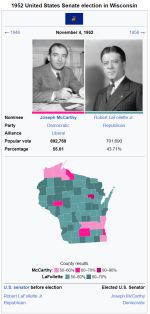
McCarthy's time as senator would lead to him joining the Liberal party as the Democrats collapsed (although McCarthy wasn't considered a traditional liberal by many). Wisconsin was growing as a state with a Liberal reputation, and although McCarthy did much of the same as LaFollette, being known for his short temper and attacks on "the enemy" from the senate floor, he did so as a man who was growing in support from "big labor". Liberals would win big in the state, with William Proxmire's election to the governor's mansion in 1954. McCarthy himself, a bombastic public speaker decrying everything he could think of, and declaring the conflict between Japan, the Soviet Union, and the United States, as that between "Collectivism and Christianity", was considered as a potential Liberal candidate for president in 1956, as he represented the "conservative" wing of the party and had lots of crossover support, particularly from Catholics. However, McCarthy declined, and instead the Liberal nomination went to Wayne Morse, a "true-blue Liberal", who selected one of the few Southern liberals, Fritz Hollings, as his running mate.
For Republicans, 1956 was a wash. Their Southern-Suburban-New England coalition had created an "unstoppable coalition", delivering them supermajorities as Liberals, Democrats, and sorted opposition crammed themselves into the few seats located in urban areas like New York, a few farmers regions, and the remnants of minority-machines in places like New Mexico. The economy, booming with the end of war, was good, and no wars had broken out. Things looked good for the party as they nominated Texas governor Jack Cox, and they planned for yet another sweep, even with a "Constitution Party" running to their right. However, Wisconsin, home of Milwaukee and a large farmer-German base turned against Cox. Indeed, the Morse ticket swept the state quite easily, even as they lost quite hard.
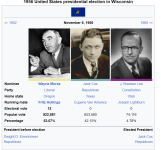
As the 50s turned into the 1960s, the state's political hero, Joseph McCarthy, had grown mentally sick. McCarthy had gone from a potential presidential nominee to a man with increasingly obvious alcoholism. His speeches had grown more slurred and his appearance more frayed, especially as his addiction transitioned to a heroin addiction. An easy win in 1958 did little to heal these concerns, and in 1961, McCarthy, the man who brought liberalism back to Wisconsin, was dead.
And so a special election was held. Republicans, in the midst of an unpopular Cox administration only barely propped up by a "rally-around-the-flag" effect by the Philippines War, knew their chances were slim, especially against Liberal governor William Proxmire, considered very popular. So Republicans hatched an idea. William Dyke, a young 31-year-old newscaster increasingly popular for his program "Face the State", was nominally a political independent. Of course, this was because Dyke was part of the nearly 75,000 Wisconsin residents who voted for J. Bracken Lee in 1956, but it made him look relatively independent. The plan was to run Dyke as an independent endorsed by Republicans, who would then use their resources to push his candidacy over the finish line. It was considered very far-out by most observers.
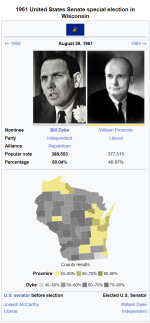
To everyone's surprise, the strategy worked. Dyke was elected narrowly, in a low turnout election. Many wondered how such a conservative voice could succeed in a state now stamped hard Liberal, but Dyke was seen as both a significantly better campaigner than Proxmire, and his attacks simply didn't work on Dyke the way they would on a four-term congressman from the west of the state. Wisconsin residents simply didn't believe that Bill Dyke, the guy seen as so nonpartisan, could have archconservative views, and it helped him significantly. Dyke would join the Republicans in 1962, and due to George Lincoln Rockwell's sweep, would win in 1964 narrowly.
[1]
OTL
[2] Butterfly as the PoD is in 1933 lol
[3] OTL (sorta) and considered the reason for LaFollette's suicide.

